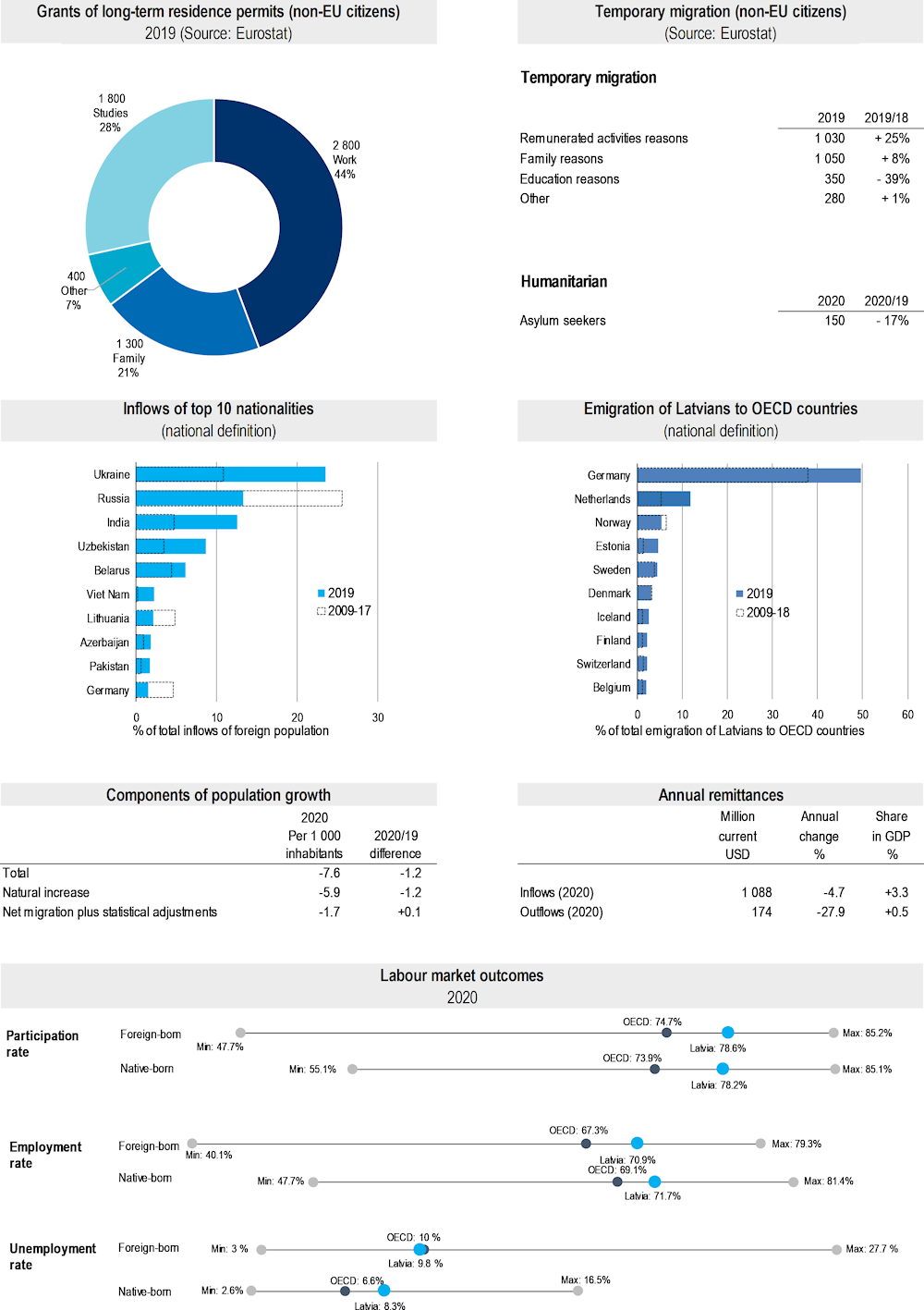In 2019, 7 400 new immigrants obtained a residence permit longer than 12 months in Latvia (excluding EU citizens), 19.8% more than in 2018. This figure comprises 45.9% labour migrants, 18.3% family members (including accompanying family), 30% who came for education reasons and 5.7% other migrants. Around 300 short-term permits were issued to international students and 1 000 to temporary and seasonal labour migrants (excluding intra-EU migration). In addition, 5 200 intra-EU postings were recorded in 2019, an increase of 140% compared to 2018. These posted workers are generally on short-term contracts.
Ukraine, Russia and India were the top three nationalities of newcomers in 2019. Among the top 15 countries of origin, Ukraine registered the strongest increase (100) and India the largest decrease (‑100) in flows to Latvia compared to the previous year.
In 2020, the number of first asylum applicants decreased by ‑19.4%, to reach around 150. The majority of applicants came from Belarus (45), Russia (10) and Syria (10). The largest increase since 2019 concerned nationals of Belarus (40) and the largest decrease nationals of Azerbaijan (‑25). Of the 120 decisions taken in 2020, 20.8% were positive.
Emigration of Latvians to OECD countries decreased by ‑2% in 2019, to 11 000. Approximately 34% of this group migrated to Germany, 16% to the Netherlands and 7% to Norway.
In 2019, activities related to the introduction of the Common European Asylum System were mainly carried out using AMIF (Asylum, Migration and Integration Fund) resources. The main measures related to the provision of information and guidelines about life in Latvia for persons with international protection status. As part of a programme to improve and develop information systems supporting migration and asylum and related processes, the government is moving towards a more electronic-based system.
In June 2019, the Saeima adopted amendments to the Immigration Law, allowing employers to recruit third-country nationals on the basis of a long-term visa. The process of receiving a visa is simpler, cheaper and faster than receiving a residence permit, thus allowing employers to attract the necessary workforce more flexibly.
At the end of 2019, the Cabinet of Ministers adopted amendments to three migration-related regulations, introducing further simplification of procedure for hiring foreigners (e.g. the term of registration of the vacancy with the Public Employment Services has been reduced from a month to 10 working days, but in certain cases, this requirement was abolished).
On 1 December 2020, the State Border Guard Law entered into force. The law integrates legal regulation of the State Border Guard with other regulatory enactments.
In 2020, the mandatory requirement to prove the existence of sufficient financial resources (according to the set salary threshold – EUR 1 076) was abolished if the third-country national had entered and applied for a temporary residence permit before 10 June 2020. For persons applying for a first-time temporary residence permit after 10 June 2020, the requirements for meeting the national salary threshold for third-country nationals continued to apply in full.
In December 2020, amendments to the Labour Law as a result of the incorporation of the EU Directive governing the posting of workers were adopted.
Those residence permit holders who in current circumstances experience a delay in applying for a repeated residence permit or registering a residence permit (ID card), may in most cases be allowed to legalise their status in Latvia by paying a state fee for examining documents in accelerated time (five working days).
Cases of foreigners staying irregularly in Latvia during the COVID‑19 emergency are examined individually; usually the immigration authority issues a D-long stay visa (national visa) or prolongs a Schengen visa on humanitarian grounds.
From 7 December 2020, the State Border Guard, in co‑operation with the National Armed Forces and the State Police, intensified monitoring of whether persons who entered Latvia met their obligation to submit a confirmation questionnaire on the personal information system website.
Under legislation related to limiting the spread of COVID‑19 infection, regulatory enactments have been introduced designed to reduce the number of on-site services and minimise direct contact between clients and service providers. The regulations will remain in force as long as necessary to limit COVID‑19 infection, but their impact will be permanent. In connection with these regulatory enactments, the range of electronic services has been significantly expanded and procedures changed to allow remote provision. It is planned to adopt these principles also in those permanent regulatory enactments relating to the entry of third-country nationals.
For further information:

